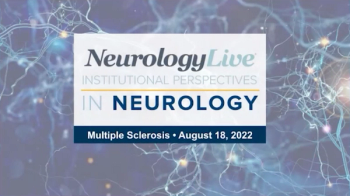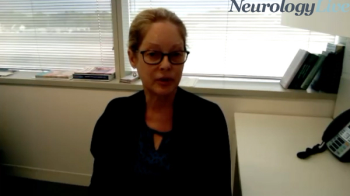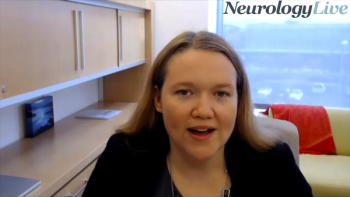
The Parkinson disease agent showed a safe and tolerable profile, with significantly greater improvements in MDS-UPDRS-III scores and OFF time per day.

The Parkinson disease agent showed a safe and tolerable profile, with significantly greater improvements in MDS-UPDRS-III scores and OFF time per day.

Test your neurology knowledge with NeurologyLive®'s weekly quiz series, featuring questions on a variety of clinical and historical neurology topics. This week's topic is stroke and cerebrovascular disease.

Danielle Kipnis, MA, of Columbia University, discussed key components of a yoga program for individuals with functional neurological disorder and from the evaluation, found it feasibility as an intervention.

Over a 2-year period, patients demonstrated improvements in Parkinson’s Disease Questionnaire scores, along with a 35% improvement in MDS-UPDRS-III scores.

The molecular biologist at the Cleveland Clinic Lerner Research Institute discussed the unanswered questions regarding biomarkers sTREM2 and GFAP, and the role they play in Alzheimer pathology.

Test your neurology knowledge with NeurologyLive®'s weekly quiz series, featuring questions on a variety of clinical and historical neurology topics. This week's topic is headache and migraine.

The molecular biologist at the Cleveland Clinic Lerner Research Institute provided commentary on how certain activity markers may help understand immune response differences in Alzheimer disease and related dementias.

Test your neurology knowledge with NeurologyLive®'s weekly quiz series, featuring questions on a variety of clinical and historical neurology topics. This week's topic is epilepsy and seizure disorders.

The associate professor of neuropsychology at the University of Miami Miller School of Medicine discussed how a new innovative tool can further characterize cognitive status and improve evaluation of agents in development for Alzheimer disease. [WATCH TIME: 2 minutes]

Chaired by Augusto Miravalle, MD, of the University of Colorado, the presentations also feature Barry Hendin, MD, of the Center for Neurology and Spine; Ilana B. Katz Sand, MD, of Mount Sinai; Brett Fling, PhD, of Colorado State University; and Gavin Giovannoni, MBBCh, PhD, of Queen Mary University of London. [WATCH TIME: 1 hour, 59 minutes]

Test your neurology knowledge with NeurologyLive®'s weekly quiz series, featuring questions on a variety of clinical and historical neurology topics. This week's topic is Parkinson disease and movement disorders.

The associate professor of neuropsychology at the University of Miami Miller School of Medicine discussed the next steps in using the Cognitive Stress Test and the remaining questions from recent findings. [WATCH TIME: 4 minutes]

The director of the Women’s Alzheimer’s Movement Preventer Center at Cleveland Clinic provided perspective on the possibility of gender-specific therapies to overcome disparities in Alzheimer disease. [WATCH TIME: 3 minutes]

Test your neurology knowledge with NeurologyLive®'s weekly quiz series, featuring questions on a variety of clinical and historical neurology topics. This week's topic is sleep disorders.

The molecular biologist at the Cleveland Clinic Lerner Research Institute discussed research on the use of GFAP and sTREM2 in discerning dementia with Lewy bodies from Alzheimer disease. [WATCH TIME: 4 minutes]

The director of the Women’s Alzheimer’s Movement Prevention Center at Cleveland Clinic discussed new research which looked at the differences in functional connectivity for men and women of older age.

The chief medical officer and cofounder of Linus Health discussed how changes in voice may help serve as early indicators for late-life cognitive deficits. [WATCH TIME: 3 minutes]

Test your neurology knowledge with NeurologyLive®'s weekly quiz series, featuring questions on a variety of clinical and historical neurology topics. This week's topic is multiple sclerosis.

Vesna Garovic, MD, PhD, chair of the nephrology division at Mayo Clinic, discussed the appropriate reaction to data suggesting late-life elevated inflammation and neurovascular damage from severe preeclampsia.

The associate professor of neuropsychology at the University of Miami Miller School of Medicine provided insight on how persistent impairments seen on a cognitive screening tool may differentiate cognitive status. [WATCH TIME: 6 minutes]

The chair of the nephrology division at Mayo Clinic discussed the major questions surrounding preeclampsia and its long-term effects, as well as whether new findings change the way clinicians treat patients with the condition. [WATCH TIME: 4 minutes]

The director of the Women’s Alzheimer’s Movement Prevention Center at Cleveland Clinic provided insight on data presented at AAIC 2022 that evaluated the interaction effect of sex and diagnosis on functional connectivity in various cognitive stages. [WATCH TIME: 3 minutes]

The chair of the nephrology division at Mayo Clinic provided context on new findings on the risks of preeclampsia, a hypertensive disorder, and elevated levels of neuroinflammation and neurovascular damage.

The medical student at Nova Southeastern University provided insight on a new innovative tool called the Cognitive Stress Test that can help distinguish different cognitive states for older adults. [WATCH TIME: 6 minutes]

The chief medical officer and cofounder of Linus Health provided insight on the outlook of acoustic measures and machine learning to further classify cognitive impairment. [WATCH TIME: 4 minutes]

Test your neurology knowledge with NeurologyLive®'s weekly quiz series, featuring questions on a variety of clinical and historical neurology topics. This week's topic is neuromyelitis optica spectrum disorder.

Jagan A. Pillai, MD, PhD, neurologist, Cleveland Clinic Lou Ruvo Center for Brain Health, discussed a recent study which found faster clinical progression in those with nonamnestic initial cognitive symptoms.

Effect modification by cognitive status and APOE genotype revealed greater effects of mild behavioral impairment with apathy in those who had normal cognition or in non-APOE ɛ4 groups.

Inflammatory coagulation pathway activator positive extracellular vesicles were significantly increased in women with a history of severe preeclampsia compared with controls and those with milder cases.

The neurologist at Cleveland Clinic’s Lou Ruvo Center for Brain Health detailed new findings on whether initial cognitive symptoms have similar rates of functional decline across a handful of neurodegenerative disorders. [WATCH TIME: 3 minutes]